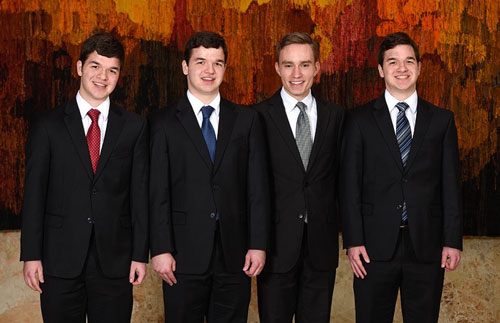Four brothers, four gold medals from Mayo Clinic
April 6, 2016
By Mike Killeen

(Left to right) Joe, Nick, James and Chris Pathoulas
Tom and Karen Pathoulas used to remind their sons each day to use their efforts to build people up.
That's advice James, Nick, Chris and Joe Pathoulas took to heart while conducting research in the Innovative Minds Partnering to Advance Curative Therapies (IMPACT) undergraduate program at Mayo Clinic.
Team Pathoulas, all students at Saint John's University (James is a senior while Nick, Chris and Joe are first-year students), won a gold medal providing a possible answer to the question, "What is the cause of sporadic fallopian tube epithelium transformation to ovarian cancer?"
"The Mayo Clinic IMPACT Program asks students for answers to medicine's most elusive questions and typifies the importance of applying critical thinking skills to a real problem," James Pathoulas said. "Nick, Chris, Joe and I found our liberal arts education at the College of Saint Benedict and Saint John's University left us well-groomed to engage with leading biomedical researchers in investigating the cause of ovarian cancer.
"When we pooled our knowledge and skills to answer this year's IMPACT question, we challenged convention and will get to test a hypothesis that may contribute to the collective understanding of ovarian cancer."
This year, students had a choice of answering three questions. Team Pathoulas chose the question on ovarian cancer because "we are all biology majors and we wanted to develop a disease mechanism with heavy focus on molecular biology," Joe said.
Ovarian cancer occurs in about 20,000 women each year in the U.S. Even with aggressive forms of treatment, the average survival rate is five years.
"The major issue with ovarian cancer is that in the earlier stages, there are little to no symptoms," said Katherine Furniss, visiting assistant professor of biology at CSB and SJU who was the faculty mentor to Team Pathoulas. "There's no reason for the woman to go in to a doctor to get checked out. By the time that ovarian cancer is discovered, it's usually around stage four, which is not good."
Last year, James Pathoulas was part of a CSB/SJU team that attempted to answer a question on hypoplastic left heart syndrome.
"Last year, I spent a lot of time making sure my disease model was in agreement with expert opinion, and I lost," James said. "This year, Nick, Chris, Joe and I spent significant time reading on ovarian cancer trying to 'get it right,' but then it dawned on us - ovarian cancer is a mystery, nobody can be an expert in something so poorly understood.
"So we gained confidence in ourselves after realizing that nobody would be right or wrong insofar as the cause of ovarian cancer — in fact — we were all just trying to answer a common question."
Their research centered on the peg cell, which is a special stem-like cell in the oviduct. The team "stumbled" on a citation from a German medical journal from the 1800s, and then traced it to a more recent publication, "which attributed novel stem cell function to a type of cell in the oviduct that was seriously understudied," Nick Pathoulas said.
"The boys came up with the idea of the peg cell being the cell's origin for this cancer, and then they went further and talked about how it became mutated and cancerous," Furniss said.
"When we presented our idea to a team of medical scientists at the Mayo Clinic (on March 5), they were fascinated. We were thrilled with their excitement," Chris Pathoulas said.
By winning the gold medal for their research, they each won $1,000. In addition, they have each accepted an opportunity to conduct summer research related to their innovative hypothesis at Mayo's downtown campus in Rochester, Minnesota.
Those are both big rewards, but loom even bigger for Nick, Chris and Joe. First-year students typically don't receive offers to do research opportunities like this.
"This is an opportunity for them that could really be life-changing, because it sets them up to be able to do almost anything they want to do, in terms of getting the next research position next year," Furniss said.
Teams from CSB and SJU have earned bronze medals in the competition the previous two years.
For more information on the IMPACT program, please contact Katie Campbell, Ph.D., at [email protected].
Campbell graduated from the College of Saint Benedict in 2010 with a degree in biochemistry. She has directed the IMPACT program at Mayo Clinic for the past three years.
CSB and SJU students interested in competing in the program in 2016-17 can also contact Katherine Furniss, visiting assistant professor of biology at CSB and SJU, at [email protected] or at 320-363-3224.
